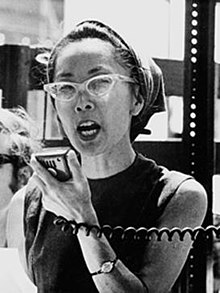Yuri Kochiyama | |
|---|---|
 Kochiyama at Central Park anti-war demonstration c. 1968 | |
| Born | Mary Yuriko Nakahara May 19, 1921 San Pedro, California, U.S. |
| Died | June 1, 2014 (aged 93) Berkeley, California, U.S. |
| Education | Compton College |
| Occupation | Civil rights activist |
| Spouse |
Bill Kochiyama
(m. 1946; died 1993) |
| Children | 6 |
Yuri Kochiyama (河内山 百合子 (ユリ・コウチヤマ), Kōchiyama Yuriko, formerly Mary Yuriko Nakahara; May 19, 1921 – June 1, 2014) was an American civil rights activist born in San Pedro, California. She was interned at the Jerome War Relocation Center in Arkansas during World War II, an experience that influenced her later views on racism in the United States. While interned, she helped run a letter-writing campaign to Nisei (transl. 'Second-generation') soldiers, wrote for the Jerome camp newspaper, and volunteered with the United Service Organizations (USO).
After the end of the war, Kochiyama moved to New York and eventually to Harlem, where she became involved in the civil rights movement. At first working with the Congress of Racial Equality (CORE), Kochiyama's friendship with civil rights leader Malcolm X led her to affiliate with Black nationalist organizations such as the Organization of Afro-American Unity (OAAU), the Revolutionary Action Movement (RAM), and the Republic of New Afrika (RNA).
Kochiyama was an advocate for political prisoners, including imprisoned members of the civil rights movement, the Puerto Rican independence movement, and others, helping to found the National Committee to Defend Political Prisoners (NCDPP)[a] in the early 1970s. She is credited with playing an influential role in the Asian American movement and was a member of the organization Asian Americans for Action (AAA). In the 1980s, she participated in the redress movement for Japanese Americans interned during World War II, resulting in the signing of the Civil Liberties Act of 1988, which offered reparations to internment survivors.
Kochiyama is noted for her revolutionary nationalist views and her opposition to imperialism. She drew controversy in 2003 by praising Osama bin Laden, comparing him to Malcolm, Che Guevara, Patrice Lumumba, and Fidel Castro. She has also been the subject of several biographies, children's books, and documentaries and was nominated for a Nobel Peace Prize in 2005 alongside 1,000 other women.
Cite error: There are <ref group=lower-alpha> tags or {{efn}} templates on this page, but the references will not show without a {{reflist|group=lower-alpha}} template or {{notelist}} template (see the help page).